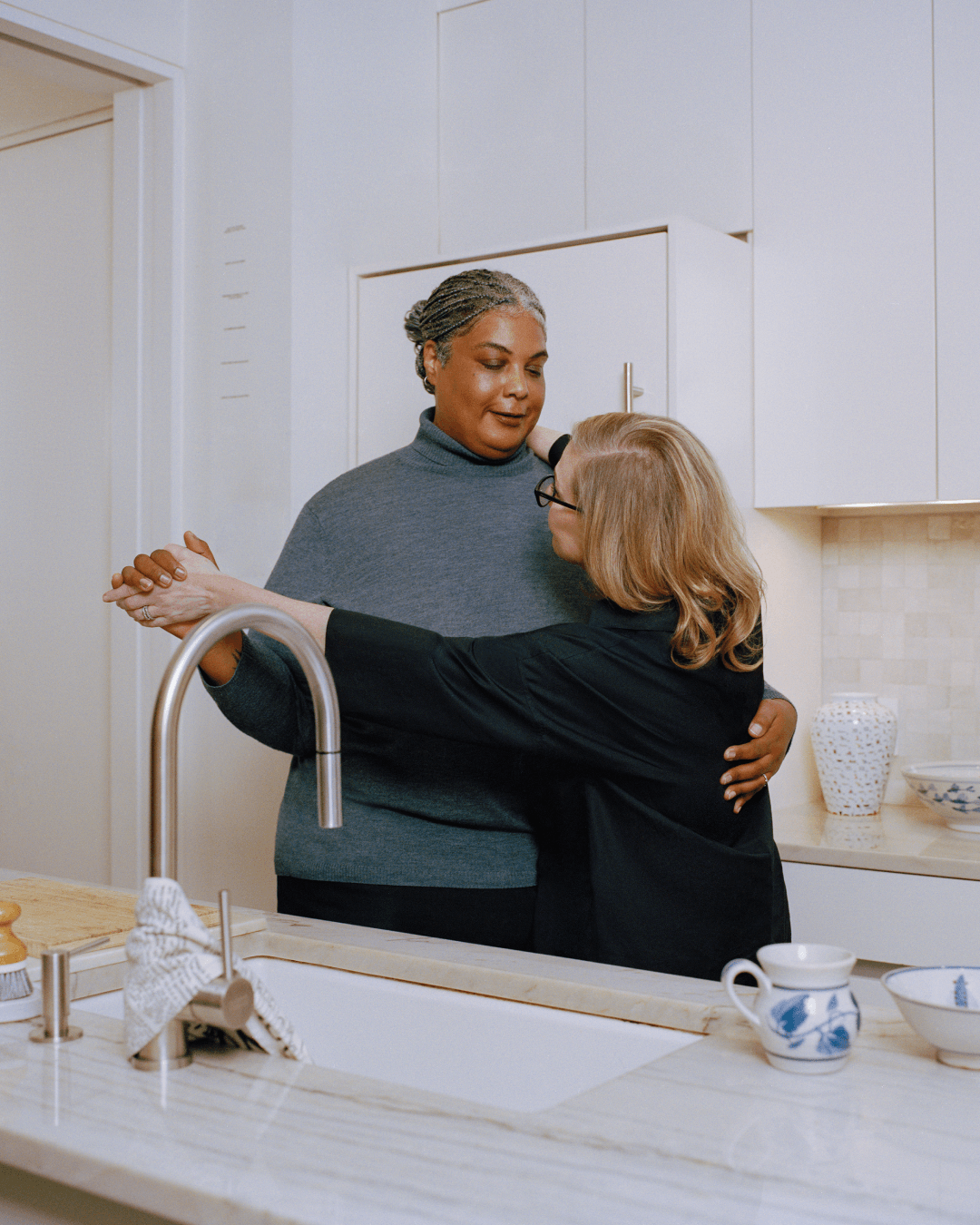How has your queerness evolved within your relationship, and also as you’ve grown older?
Debbie: I didn't come out until I was 50, meaning I've only been out publicly, to myself and to the world, for 13 years. It's evolved quite a lot, from somebody who was really scared to be who I was, into somebody proud, really understanding what the word “pride” means.
So for me, coming into my queerness has been life-changing and life-affirming. And I've never looked back.
But one thing I would say is that, before meeting Roxane, I wasn't really comfortable with public displays of affection in general. I was always very closed off with that, and I'm not at all with Roxane. I am always happy for public displays of affection and probably instigate way more than Roxane does because she's shy. Now I like holding hands, walking arm in arm and being very out about our relationship. Part of the reason is people will often ask us if we're together, because we're different races, and I've gotten tired of that. I just retort back, “yeah, we're married!”
Roxane: I would say it is 80% race. Also, to some people, maybe we just don't necessarily look like we would go together.
A lot of people assume we’re not in a relationship. So I love that Debbie is so comfortable articulating, “Oh, no, this person’s with me”. I feel the same way: “This person’s with me.”
As for my journey with my queerness, I've been out since I was 19, so for a very long time. And I'm very fortunate and grateful that I never struggled with it, never worried about God or anything like that. I think what has really changed is that, when I first came out, I would festoon myself with rainbow stuff. Rainbow everything all the time. Rainbow bumper stickers on my car. I would wear Pride rings everywhere. And I'm not ashamed of that. I needed that kind of affirmation because I was living in a very small community in Nebraska, and the queer community was of course even smaller. So these symbols mattered as a way of communicating to other people, “hey, we're family, I'm one of you”. But I don’t feel the need as I've gotten older to festoon myself in pride memorabilia to assert that I'm queer. I'm just queer. And either you recognize that or you don't, but it doesn't change my queerness.
I have now found other ways – other non-product related ways – of communicating queerness as I've gotten older, and that's been good. For example, I'm visibly very gayly married and I talk about my wife in casual conversation. Back when I first came out, I didn't think that marriage equality was going to happen in our lifetime. I never imagined it. And so when I asked Debbie to marry me and we actually did get married, I thought, ‘oh, it's just a piece of paper’. Turns out, it's not. It sort of leveled us up, and personally, I felt more of a gravity between us in the best possible ways.
I think a way we've gotten queerer is that we have really learned how to build a life together and we don't question it, we don't let other people question it, and we don't apologize for it. And I think that's one of the queerest things you can possibly do: live unapologetically and openly, particularly given the political climate.
In fact, I just came from Barnard where I was talking to a class, and afterwards, two queer kids came up to me and were like, "It's just so great to hear you talk about your wife. It gives me hope that I'll be able to do the same thing someday". I was like, “Of course you're going to be able to do that someday when you find the right person”. It's things like that – talking about our marriage and being married – that we've been able to take for granted in a way, especially because we happen to live in two very liberal places, so we get the freedom and the safety to do this, and I don't take that for granted either. But trying to hold onto sentiment of ‘we're not going back, we're not undoing this, and you can't undo it no matter what you try’ – that feels very queer to me, wherever you are.
Another way that I feel like our queerness has evolved is with our families. We are out with our nieces and nephews, they know who we are. We spend a bit more time with my family, and they love Debbie. It just feels beautifully, beautifully modern, like queer in a modern way. That's very nice that it's not special, it's not remarkable. We're not even the only queer couple in our family. To be able to be part of a modern family that includes queerness, where it's not remarked on at all, nobody ever blinks an eye, it just is. Like, ‘this is my person’ and it is accepted and vice versa.
Debbie: I think the relationship, has in part made that possible, I think feeling secure in each other's love extends outward to others.
Explore all questions, or read more about navigating the holidays
NFAQ is an educational guide for Not-So-Frequently-Asked questions, submit a question to expand this discussion.
HaveMoreQuestions?
NFAQ is an educational guide for Not-So-Frequently-Asked questions, submit a question to expand this discussion.



